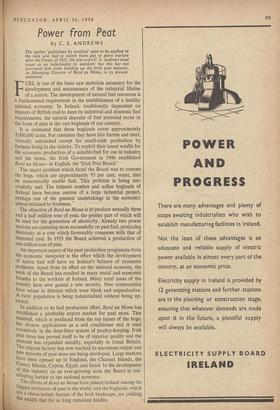Power from Peat
By C. S. ANDREWS
The epithet 'politicians by accident' used to be applied to the men who had to switch from gun to party warfare after the Treaty of 1921. On that score C. S. Andrews must count as an industrialist by accident; but this has not prevented him from building up the Irish peat industry, as Managing Director of Bord na Mona, to its present eminence.
FUEL is one of the basic raw materials necessary for the development and maintenance of the industrial lifeline of a nation. The development of natural fuel resources is a fundamental requirement in the establishment of a healthy national economy. In Ireland, traditionally dependent on imports of British coal to meet its industrial and domestic fuel requirements, the natural deposits of fuel potential occur in the form of peat in the vast boglands of our country.
It is estimated that these boglands cover approximately 3,000,000 acres. For centuries they have lain barren and inert, virtually untouched except for small-scale production by farmers living in the vicinity. To exploit their latent wealth for the economic production of a suitable fuel for use in industry and the home, the Irish Government in 1946 established Bord na Mona—in English, the 'Irish Peat Board.'
The major problem which faced the Board was to convert the bogs, which are approximately 93 per cent. water, into an economically usable fuel. This problem is being suc- cessfully met. The hitherto sombre and sullen boglands of Ireland have become centres of a large industrial project, perhaps one of the greatest undertakings in the economic sphere initiated by Irishmen. '
The objective of Bord na Mona is to produce annually three and a half million tons of peat, the greater part of which will be used for the generation of electricity. Already two power stations are operating most successfully on peat fuel, producing electricity at a cost which favourably compares with that of imported coal. In 1955 the Board achieved a production of one million tons of peat.
An important aspect of the peat production programme from the economic viewpoint is the effect which the development of native fuel will have on Irelthicl's balance of payments problems. Apart from its effect on the national economy, the work of the Board has resulted in many social and economic benefits to the workers of Ireland. Many rural areas of the Country have now gained a new security. New communities have arisen in districts which were bleak and unproductive. A rural population is being industrialised without being up- rooted.
In addition to its fuel production effort, Bord na Mona has established a piofitable export market for peat moss. This Material, which is produced from the top layers of the bogs, has diverse applications as a soil conditioner and is used extensively in the deep-litter system of poultry-keeping. Irish Peat moss has proved itself to be of superior quality and the demand has expanded steadily, especially in Great Britain. The original factory has now reached its maximum output and new deposits of peat moss are being developed. Large markets have been opened up in England, the Channel Islands, the Canary Islands, Cyprus, Egypt, and Israel. In the development of this industry on an ever-growing scale the Board is con- tributing further to the national economy. . The efforts of Bord na Mona have placed Ireland among the biggest producers of peat in the world, and the boglands, which are a characteristic feature of the Irish landscape, are yielding the, wealth that for so long remained hidden.


















































 Previous page
Previous page